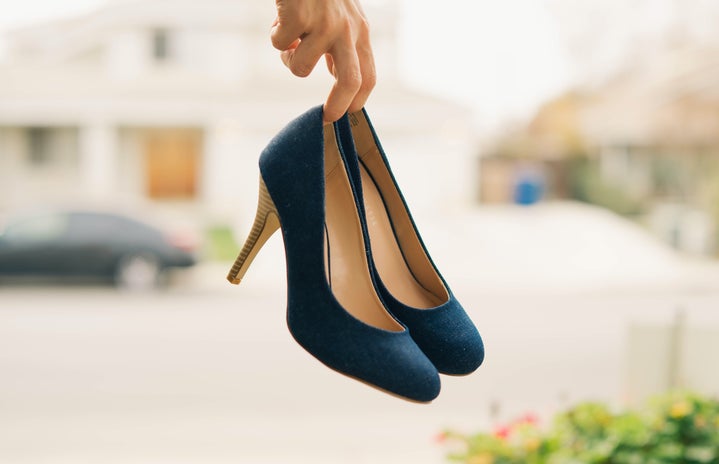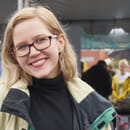Maria Rose Belding is a problem solver. After noticing the scale of the food waste epidemic in the donation process, she created a database to distribute over-donated products to the places that needed them. MEANS database, and Belding herself, was recognized by national organizations like CNN, the Obama White House, L’Oreal and even our very own Her Campus. Belding was chosen as out CAS Woman of the Year this year for her dedication to changing the world while still pushing toward graduation.
Her Campus at American University: How did you settle on this career path?
Maria Rose Belding: I’ve known since I could start forming thoughts that I want to be a physician. As I got older and started building MEANS, I realized that I am also passionate about medicine from 10,000 feet — public health. Public health is all about making broad changes to policies and systems to improve the wellbeing of an entire population, while medicine is about helping one individual. I love them both, so a public health major with my pre-med requirements met was the perfect choice for me.
HCAU: What brought you to AU?
MRB: AU is one of very few universities with an undergraduate public health degree, so that alone left my list at about a dozen schools. I toured about half of them, including AU, when I was already in their respective cities giving speeches. I toured AU with my dad, and something about it just felt really right. I loved how passionate the students were about social justice, how diverse the campus was and how LGBT-friendly everyone seemed to be. Those were all a big change from an Iowa hometown where Sarah Palin premiered her documentary about herself, and it was exactly what I wanted and needed from an education.
HCAU: It seems like you’ve had a relatively irregular college experience. Tell me a bit more about that.
MRB: Oh yes. Irregular might be putting it kindly! I am enormously privileged to serve as the co-founder and executive director of the MEANS Database, a nonprofit communications platform for emergency food providers and their donors in 49 US states. In English: we built a free website that matches up excess food with communities in need. We have a team of ten staff and interns, seven of whom are AU students, and I am enormously proud to be their leader. Working 40+ hours a week, every week, while taking 17 hard science credits is rough, to put it politely, but I wouldn’t trade it for the world. If I had the sheer luck or skill set or timing or whatever circumstance to make an impact on other people’s lives while in undergrad, what on earth would have been my excuse not to do it?
HCAU: Tell me more about your campus involvement and what achievements stand out.
MRB: I am the most proud of the impact we’ve had at MEANS, all the while working from my Hughes dorm room, then MGC, and now DMTI in the new, much-improved AU Center for Innovation. We’ve become the largest food recovery technology company, for-profit or nonprofit, by geography in the United States, and we’ve done it with a team of college and high school students running around between classes. We’ve helped find new homes for more than 2,000,000 pounds of food, and it’s all been at no cost to our nonprofit partners or our food donors. I’m also proud to have been named a L’Oreal Women of Worth in 2015, and a Top Ten CNN Hero of the Year at the end of last year, becoming the youngest woman ever to claim that title. The event was during finals, so I had to take my last Organic Chem exam in the CNN headquarters in New York, because I didn’t have time post-ceremony to make it home!
HCAU: What’s your dream job?
MRB: For this stage in my life, I have it right now at MEANS. For the future, my dream job is as an emergency medicine attending physician at a hospital serving disproportionately low-income or otherwise disenfranchised populations.
HCAU: Female role models?
MRB: Dr. Elizabeth Blackwell, Clara Barton, Michelle Obama, Dr. Esther Choo and Dr. Leana Wen.
HCAU: What inspires you to get out of bed every morning?
MRB: The people we serve at MEANS. Hunger in America is so solvable. The reasons people are hungry are just as complicated as the reasons they are poor, an unending mix of lack of access to education, poorer healthcare, systemic racism and sexism and classism, mental illness, substance abuse, domestic violence, intergenerational trauma and so much more. The reasons people are hungry are complicated and enormously difficult to fix, but the answer to the hunger itself is right in front of us: we throw away 40% of our edible food supply in the United States.
HCAU: Name two things on your bucket list.
MRB: Go to the Scottish Isles. Do a full backflip (hard with the heart condition, but it’s on there anyway).
HCAU: What are the most important lessons that college has taught you?
MRB: How much tougher I am than I thought I was. I’ve somehow pulled off running a nationwide nonprofit while getting competitive grades in a pre-med program, while living with type one diabetes and a heart condition that lands me in the hospital as recently as yesterday. College taught me how much tougher I am that I thought I was, and how much having great friends and coworkers can make the impossible plausible.
HCAU: Advice for younger people in your field?
MRB: Show up. We can be out-funded, out-qualified, out-connected and out-smarted, but we should never be outworked. How hard we work is the one thing we can control, and the thing many people don’t fully commit to.
HCAU: Where do you see yourself in 5 years?
MRB: In residency somewhere, a full-fledged physician furthering my training in emergency medicine.
Belding is graduating this may with her Bachelor’s of Science in Public Health on a pre-med track and plans to stay at MEANS while she takes the MCAT this summer and applys to medical schools.
Photo Credit: Halle Jaymes


